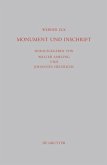The Greek inscriptions of regions extending from the Persian Gulf to the Hindu Kush are traditionally dealt with by specialists in oriental studies, and are little known to wider circles of scholars interested in the ancient world. This work contains about 100 texts with translation and commentary. In the style of a reader it draws attention to interesting topics such as: the decrees of the Indian king Ashoka Piyadassi, which contributed to the spread of Buddhism; texts documenting the palace administration of the Seleucid rulers or the history of the Parthian princes; the trade carried on by caravan of the Persian king Shapur and his defeat by Septimius Odaenathus in command of the Roman forces.
Die griechischen Inschriften der Gebiete vom persischen Golf bis zum Hindukusch werden traditionell von Spezialisten der Orientwissenschaften bearbeitet und sind im größeren Kreis der Altertumskunde wenig bekannt. Die vorliegende Arbeit von circa 100 Texten mit Übersetzung und Erklärung lenkt in der Art eines Lesebuches den Blick auf interessante Themen, so z. B. die Erlasse des indischen Königs Asoka Piodasses, die der Verbreitung des Buddhismus dienten; Texte, die den Palastdienst bei den Seleukidenherrschern oder die Geschichte der Partherfürsten dokumentieren; den Karawanenhandel zum persischen Golf hin und den Seehandel weiter nach Indien, die große Inschrift des persischen Königs Schapur und dessen Bezwingung durch den römischen Befehlshaber Septimius Odainath.
Die griechischen Inschriften der Gebiete vom persischen Golf bis zum Hindukusch werden traditionell von Spezialisten der Orientwissenschaften bearbeitet und sind im größeren Kreis der Altertumskunde wenig bekannt. Die vorliegende Arbeit von circa 100 Texten mit Übersetzung und Erklärung lenkt in der Art eines Lesebuches den Blick auf interessante Themen, so z. B. die Erlasse des indischen Königs Asoka Piodasses, die der Verbreitung des Buddhismus dienten; Texte, die den Palastdienst bei den Seleukidenherrschern oder die Geschichte der Partherfürsten dokumentieren; den Karawanenhandel zum persischen Golf hin und den Seehandel weiter nach Indien, die große Inschrift des persischen Königs Schapur und dessen Bezwingung durch den römischen Befehlshaber Septimius Odainath.








